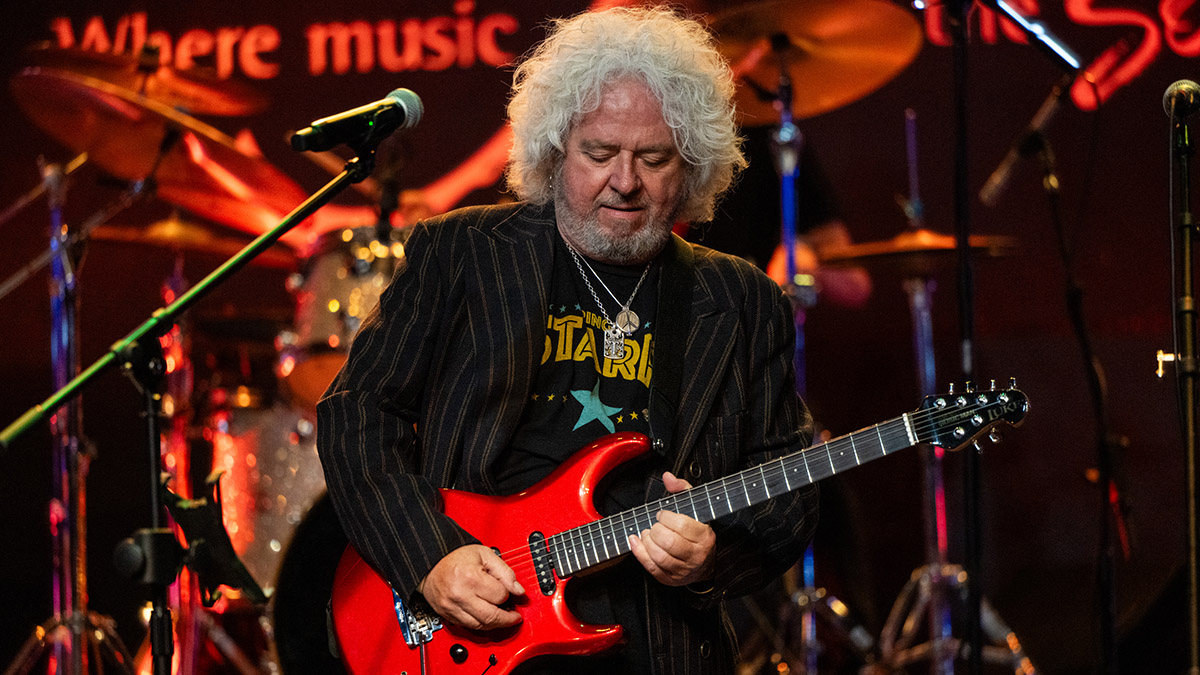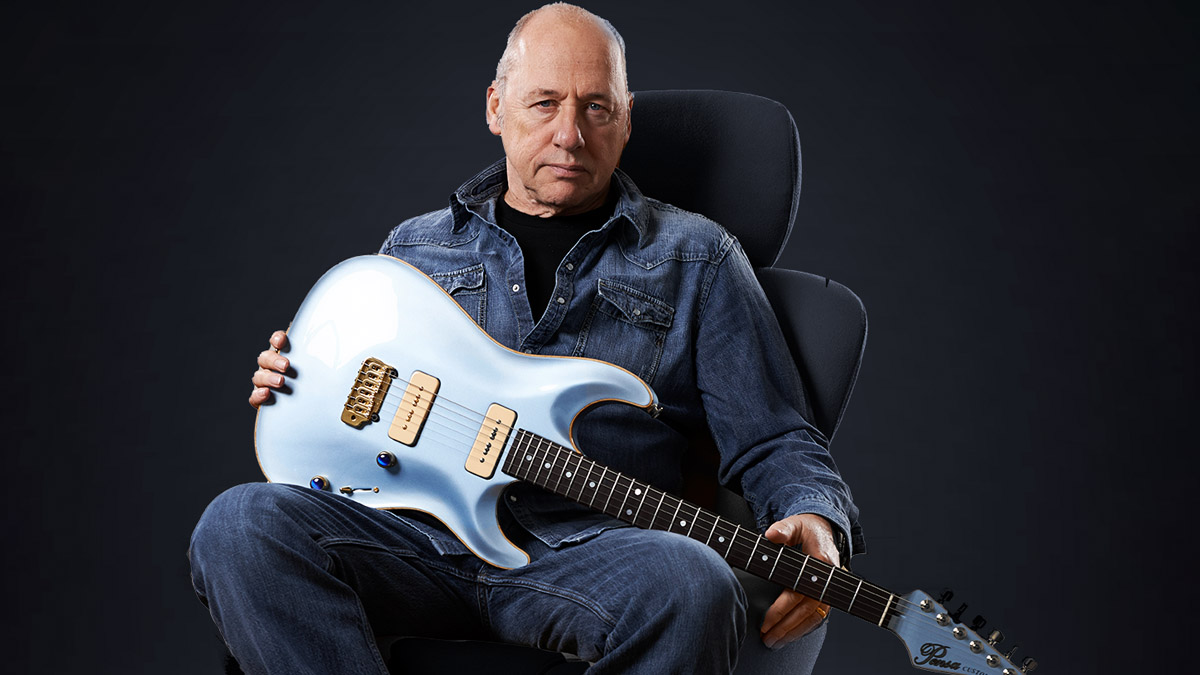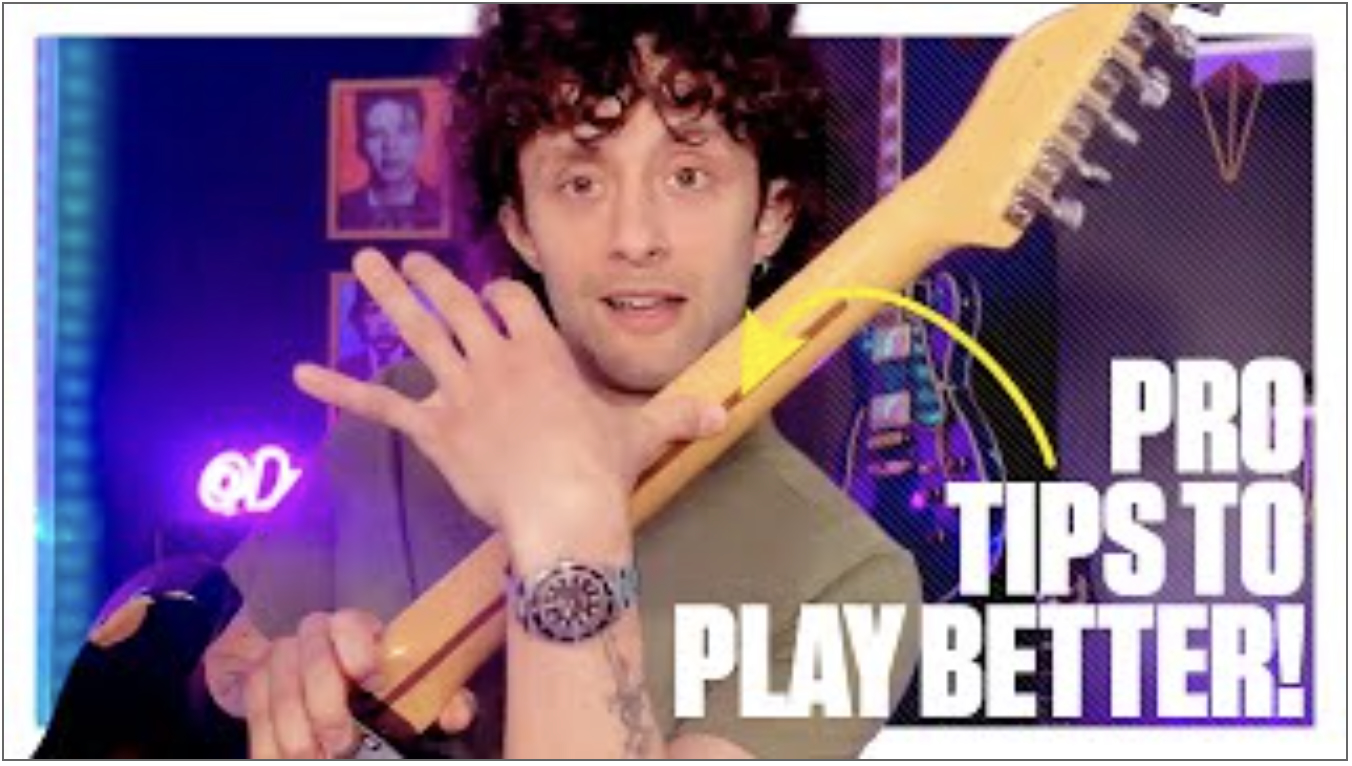“The initial thought was, ‘What the hell am I gonna play?’ There are so many players on this track, and so much is going on, but they just let me be me”: Steve Lukather takes you behind the scenes of Mark Knopfler’s Guitar Heroes
Going Home is the all-star charity guitar track of the year, with Knopfler recruiting over 50 players to the cause. Toto legend Steve Lukather reflects on making a little bit of music history

When Mark Knopfler’s Guitar Heroes was hailed as “a landmark in rock music history”, it was no exaggeration. The former Dire Straits leader has pulled together an astonishing lineup of famous players to appear on a charity single in aid of noble causes including Teenage Cancer Trust and Teen Cancer America.
Going Home (Theme From Local Hero), a song written by Knopfler and originally released back in 1983, was recently reworked as an extended showcase in which he is joined by legendary guitarists including David Gilmour, Eric Clapton, Pete Townshend, Brian May, Slash, Steve Vai, Ronnie Wood and Joe Walsh. Poignantly, it also features the last ever recorded work of guitar icon and innovator Jeff Beck.
And elsewhere, layered within Knopfler’s six-string tapestry, is longtime Toto man and general session legend Steve Lukather, who was more than happy to lend his licks. “Are you kidding me?” Luke tells Total Guitar. “To be a part of something like this, which is so cool, and to be on this with all those cool players for such a great cause – it’s an honour. I just wanted to be a part of it.”
In his typically Southern Californian way, Luke breaks down the experience as only he can. “It was special to be a part of something so great,” he says. “I hope it raises millions of dollars for the cause because it’s a really good one. I don’t know Mark personally, but he’s very into philanthropic work, as we’ve seen with him auctioning off all his guitars.
“I can relate to getting to the point where you have a warehouse full of shit and you say, ‘Why?’ I’m at a stage where I want to give back and just be thankful for what I’ve got. I’m into simplicity now. So, it’s very easy to want to be a part of it…”
So how did you end up involved with this project?
“It’s funny, because I was very flattered to get the call. I was immediately into it and said, ‘Yeah, let’s do it!’ They basically reached out to me out of the blue, which had me saying, ‘Wow’, as they already had so many people involved. I made zero demands and just did what I did. It was a lot of fun.”
Get The Pick Newsletter
All the latest guitar news, interviews, lessons, reviews, deals and more, direct to your inbox!
Once you dug in, what were your initial thoughts regarding what you were hearing?
“The biggest thing was that I didn’t want to put much input into it other than trying to find something cool to play. I hadn’t heard the full track at first, so I wasn’t sure what they were gonna keep, but my initial thought was something like, ‘Man, this is such an undertaking to get so many people like this on one track!’”
When they reached out, I was like, ‘Wow, you’ve got so many people, so what do you want me to do here?’ And they basically said, ‘Just do what you do’
What was your approach?
“I knew that the track was stuffed from top to bottom, so I had to figure out a way to play over all of that. I kinda figured I should stay outta the way, and I came up with some cool rhythm parts and stuff like that. I said, ‘Seems like everyone else is playing all this crazy stuff.’ And I appreciated that, and my thought was to do something a little lower key.”
Did Mark give you any direction?
“Interestingly, no. When they reached out, I was like, ‘Wow, you’ve got so many people, so what do you want me to do here?’ And they basically said, ‘Just do what you do.’ I said, ‘Well, thanks!’ So I had no other input other than, ‘Try and find something interesting to play.’ And like I was saying, that wasn’t easy since there are so many amazing players in one zone.”
While working out your parts, did anything immediately stick out?
“It was hard since they sent me a pre‑mixed [song], so I had to work with this in-progress thing. I couldn’t dissect it and take it apart to see who was who. That said, some players’ styles are more obvious than others, so there was that. I also didn’t have a lot of time, so it wasn’t something where I could get super-deep into it. I just found some little parts, added them, and I guess they liked it!”
Surely you found a way to add some of those quintessential Steve Lukather touches?
“Ah, you’re too kind! I realised that there was a lot of single-line stuff going on, so that impacted how I went about adding some rhythms and the textures I used. And as far as Mark goes, I’ve been a big fan of his playing forever, though we don’t really know each other. We’ve met briefly, and his stuff definitely stuck out. I was just honoured to be asked to be a part of it.”
The track features the final recording by Jeff Beck…
“Knowing Jeff was on it was pretty cool. I mean, it’s no secret how much I love Jeff Beck’s playing, man. We’d known each other since ’82, and I’d worked with him on a bunch of stuff. Jeff was and is my favourite single-note guitar player ever on this Earth. Granted, I know there are many great players, but if you ask anybody, they’ll tell you Jeff was the guy.”
When Jeff played, everyone else would stop playing and listen. I would be like, ‘Okay, let’s watch the master work’
Did you find Jeff’s contributions particularly moving?
“I haven’t heard the final mix, so I can’t say for sure. But that cat never stopped moving forward and never stopped moving the needle. He was a quirky dude, man, but at the same time, he blazed his own trail. I don’t think there will ever be anyone like him again. He’s up there in the same space as Hendrix, and he’s one of the true innovators of the guitar.”
Considering how Jeff’s playing often brought guitar circles together, it’s special that his last recorded piece is part of track designed with the same purpose in mind.
“Jeff was a one-of-a-kind player and guy. I toured with him, got to record with him, and all that stuff. When Jeff played, everyone else would stop playing and listen. I would be like, ‘Okay, let’s watch the master work.’
“He always brought something special to the game in the sense that you can hear one note and go, ‘Oh, there it is. There it is, man!’ It never had to be a flurry of crazy notes. It just had to be one fucking note that would bounce off the wall and back at the listener. One note, and everyone would be on their feet. That’s a special player.”
Though you don’t know Mark, has his playing affected you much?
“I’m a huge fan. Mark is another one of those unbelievable, unique and wonderful players. He’s a fingerstyle guy, and his touch is amazing. From what I’ve gathered over the years and from what I’ve listened to – which is a lot – Mark is an incredible guitarist. And like I said before, he wasn’t there when I recorded and gave me no notes. He never said, ‘Play this, or do that.’ There are so many players on this track, and so much is going on, but they just let me be me.”
There are 54 musicians on the track, and yet you found a way to stand out.
“It’s crazy, because the initial thought was, ‘What the hell am I gonna play?’ But I found this little muted part, with more than a few notes, and managed to create some parts that fit well in there. It was important for me to stay in my lane, you know? I felt like I needed to jump back because, with all these players on there, I just wanted to find something to help the track and not get in the way.”

Your career as a session player served you well to that end!
“I think so, too. I’ve done that in a lot of instances in my life, and maybe that’s why they sent the track to me – they knew I’d do something like that. But it was flattering not to be told what to do, and it was cool that they said what I did was great. They said, ‘Oh, this is different from what everyone else did, thanks!’ It was a lot of fun and a massive honour to be in the same musical space and on the same track as players I consider my favourites, many of whom are dear friends.”
I don’t have a home studio – I believe in separation of church and state! Home is home, and work is work
Where did you record your parts?
“I don’t have a home studio – I believe in separation of church and state! Home is home, and work is work. But I’ve got a million friends, and my son [Trev Lukather] has a studio, but he wasn’t around. Otherwise, I would have asked him.
“So, my old friend [Toto vocalist] Joseph Williams said, ‘Come over to my house, and we’ll do it.’ He engineered it, helped me put it together, and we sent it back. The big thing was to be in a place that I thought would sound good, so that’s what I did. It took maybe an hour.”
What was your recording rig?
“I had my Music Man [Luke 4 HH] that I’ve been playing forever, but my rig was a little different. I have a totally new pedalboard that my tech is putting together for me with all different stuff, but it’s still being built. So, I had this Mickey Mouse temporary rig with the Music Man, one of my favourite 50-watt Bogner amps, my Shure SM57 mics, a little reverb, and some compression. That was it.”
Do you feel any one player stole the show?
“That’s impossible to answer. You’re talking about a roster full of legendary people, all of whom have their own voices. I dig them all for different reasons. I mean, the whole ‘who is the best’ thing is just an impossible question. Hell, who is the most beautiful person in the world? I can say these types of things and ask them, but none of it matters. Everybody has their own voice and can play great shit – and that’s what I heard. The track and the people speak for themselves. I can’t pick a favourite.”
I made the cut among some amazing players who are friends and heroes. It’s a cause toward a very positive thing
A lot of people are referring to this as the We Are the World of guitar playing. That’s heavy praise.
“Once you get a lot of great people together for a good cause, all the bullshit goes away. If you’re doing this for nothing other than the cause and because you want to be a part of it – which is the way this was – it can’t go wrong. They came to us with the idea that this was a charity project, explained what it was, and that Mark put it together and wrote the piece.”
And how do you view and relate to it on a personal level, if at all?
“It sounds like something Mark would write, and he procured amazing people, which again leaves me very flattered. I made the cut among some amazing players who are friends and heroes. It’s a cause toward a very positive thing. Whenever I can give back, I do it. I’ve been blessed, so I need to give back. But need aside, I want to give back, too.”
Andrew Daly is an iced-coffee-addicted, oddball Telecaster-playing, alfredo pasta-loving journalist from Long Island, NY, who, in addition to being a contributing writer for Guitar World, scribes for Bass Player, Guitar Player, Guitarist, and MusicRadar. Andrew has interviewed favorites like Ace Frehley, Johnny Marr, Vito Bratta, Bruce Kulick, Joe Perry, Brad Whitford, Tom Morello, Rich Robinson, and Paul Stanley, while his all-time favorite (rhythm player), Keith Richards, continues to elude him.










![[from left] George Harrison with his Gretsch Country Gentleman, Norman Harris of Norman's Rare Guitars holds a gold-top Les Paul, John Fogerty with his legendary 1969 Rickenbacker](https://cdn.mos.cms.futurecdn.net/TuH3nuhn9etqjdn5sy4ntW.jpg)





